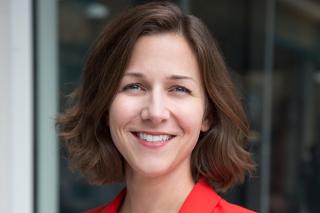We chatted with Elaine Dimopoulos about her work as an author!
What was your major at Simmons and what is your current job title?
I earned an MFA in writing for children. I am currently an author and a writing instructor.
What's the most rewarding part of your work?
It sounds simple, but it's the writing. Nothing feels better than a day when a promising new scene emerges for a story. The blog tours and bookstore visits are fun, but they are secondary to the creation of new work.
Any tips for work/life integration?
This is a topic I think about a lot. If possible, I suggest experimenting until you hit that sweet spot when both work and family are bringing you joy. This balance may look different for different people. I'll say for those in creative fields that you must be ruthless about carving out time for your craft, even if you're just starting out. Respect yourself, respect your ambitions and respect the dedication all creative journeys demand.
When did you know you wanted to write young adult fiction?
I was teaching high school and middle school English, and reading great books with my students, and I wondered if I couldn't give writing a shot. I have always loved children's books, and my stories naturally wound up featuring children and teens.
How did Simmons help you cultivate your writing skills?
My first year in the program, I had a wonderful writing teacher, author Hannah Barnaby, who taught me so much about craft: how to flesh out characters, write convincing dialogue, incorporate humor, etc. The second year we shared our writing with professional mentors active in the field. It was more rigorous—even painful at times!—but akin to the real-world experience of a writer.
What was your inspiration for Material Girls?
I taught at a school where certain mothers and daughters dressed similarly. I wondered if the moms weren't occasionally eyeing their daughters for fashion tips, and the idea of a world where kids were the official arbiters of trends and taste grew from there. I explored this world in a short story called "First Bloom" for my Simmons MFA application and later realized that I could expand my vision if I combined a focus on youthful clothing trends with broader commentary on our culture's obsession with celebrity, youth and consumption.
What were some challenges you faced when writing Material Girls?
At times, my writing slipped into satire, and I'd find myself mocking my two teen protagonists. For example, I played around with making Ivy Wilde, the pop star character, be a bad singer. This was a terrible idea because my goal was not to get other adults to laugh at her; it was to get teen readers to connect with Ivy and to present a complex and sympathetic picture of what it means to be a child superstar. Once I forced myself to imagine life from my characters' perspectives, their depth and likeability improved.
What social media accounts do you follow?
On Twitter, I follow a bunch of accounts related to sustainable fashion. I also follow people in "the biz": authors like Patrick Ness, agents like Jennifer Laughran (she's funny!), and librarians like Betsy Bird.
What's your favorite young adult fiction book or series?
Feed by M.T. Anderson. Material Girls is an homage to this novel in certain ways.
Who is your favorite author?
Hard to say. These days, I'm loving Karen Russell's short stories.
Why is young adult fiction an important genre?
It is as important to tell stories about people of different ages as it is to represent different genders, races, income levels, sexual orientations, etc. in literature. Young adult voices are part of this mix and should never be discounted. The coming of age story is one that shares common elements across borders and time: gradual separation from parents, sexual awakening, development of a personal and distinct worldview and hope and anticipation regarding the future. What a great moment in a person's life to write about!
What woman do you most admire? What has she taught you?
Betty Friedan is one idol. She ignited the Feminist Movement while raising three children. She reminds me that you don't have to be sweet to be an effective leader.
What's the best career advice you've gotten along the way?
Don't pay attention to reviews of your books. The good ones overinflate your ego; the bad ones send you into an unproductive spiral of hurt and pain.
What's your Simmons moment?
I remember an end-of-semester party when my children's literature cohort stayed in a classroom in the Main College Building long after most people had left. We talked into the night and cemented our friendships. Seven years later, many of us still gather regularly in Boston to talk children's books.

